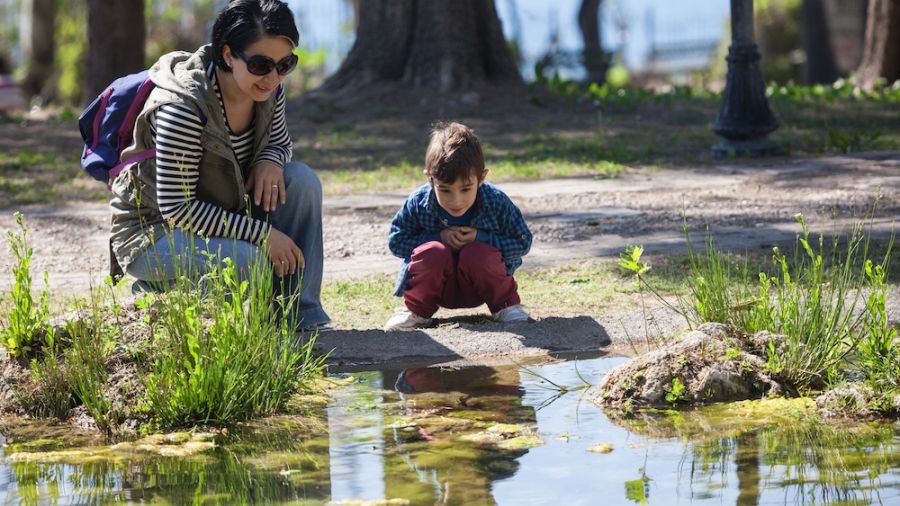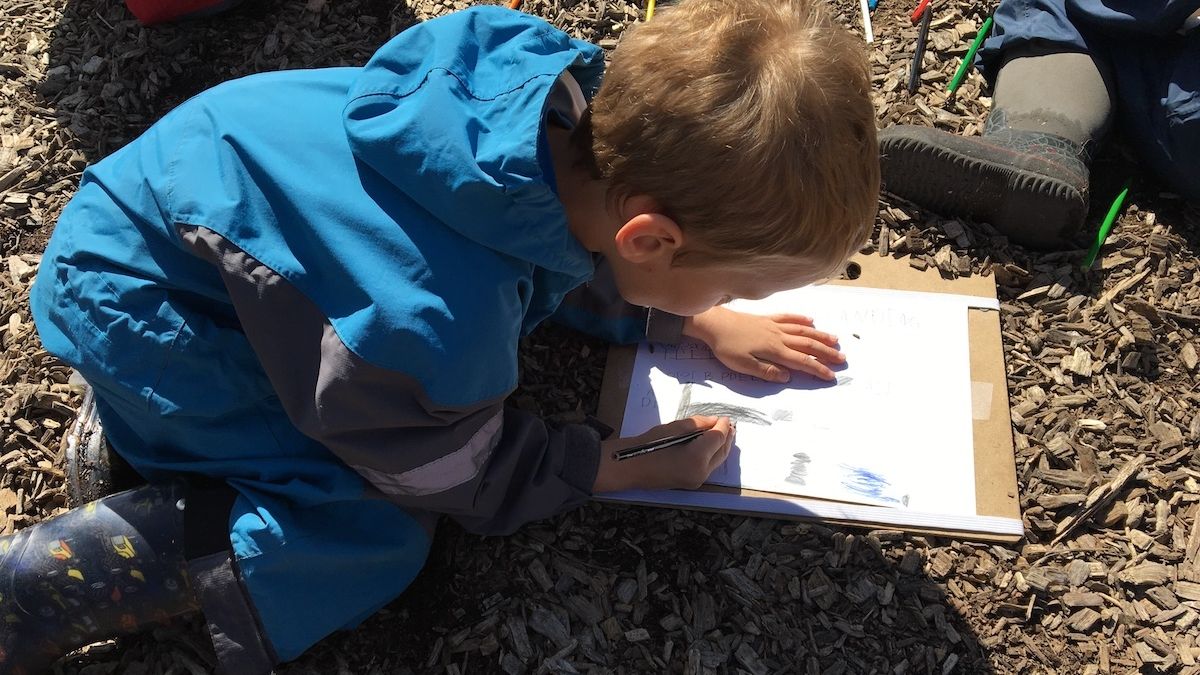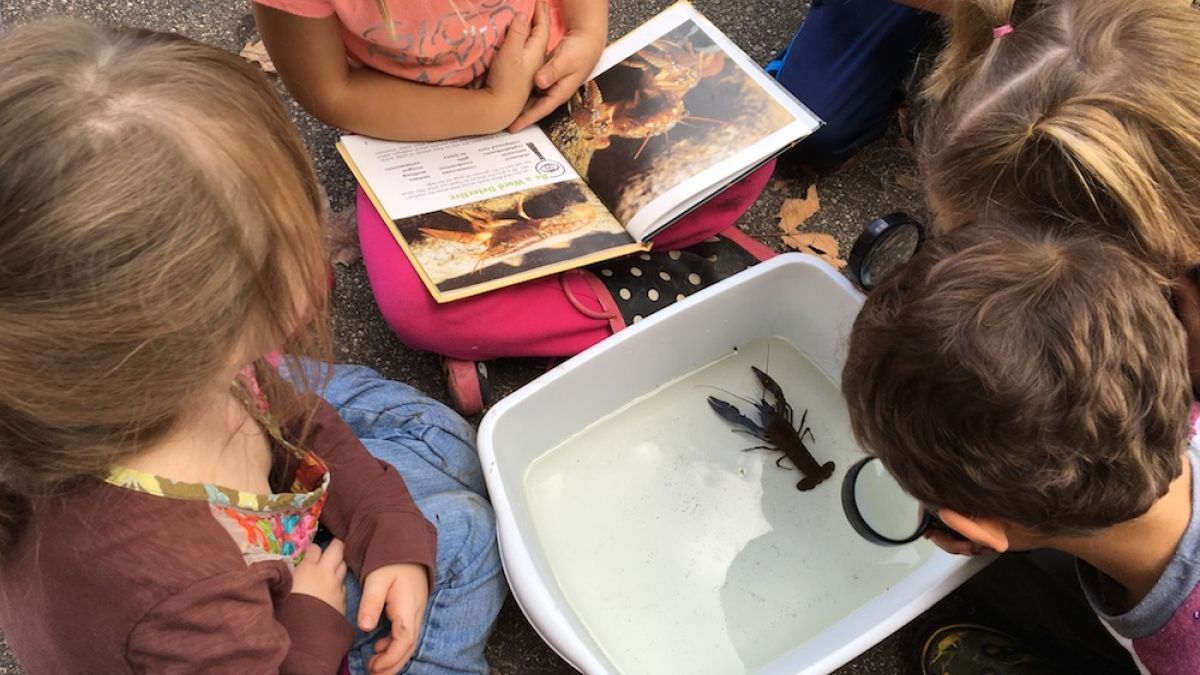
Until just a few years ago, nature-based early learning experiences consisted primarily of schools and early childhood programs taking field trips to local nature centers. There, accompanied by teachers and chaperones, students attended classes taught by naturalists, interpreters, and other environmental educators. While the classes differed depending on the topic, they typically lasted one hour and involved a large group introduction followed by smaller group activities that incorporated hands-on learning experiences outdoors.
While field trips to nature centers remain very popular, today there is an increasing number of nature preschools, forest kindergartens, and other early childhood programs with a substantial outdoor component that operate independently of a nature center. These programs differ by geographic region and type of access to natural spaces, but are grounded in a common philosophy that places nature at the heart of education and allows the curriculum to emerge from the students’ own interests and experiences. These programs require teachers to have a different skillset than a typical naturalist or a traditional early childhood educator. The programs’ success depends on finding ways to assess potential teachers’ ability to put that philosophy and skillset into practice and facilitate quality nature-based learning experiences.
This article provides examples of interview questions that will help nature-based programs evaluate a candidate’s experience and knowledge of the nature-based preschool philosophy while providing insight into their areas of strength and areas where additional training or support may be needed.
As you go through this list, keep in mind your program’s ability and commitment to staff training. Some skills can be easily taught, whereas other skills, particularly those that require a change in an experienced teacher’s approach, take more time to learn and may require more intensive support from the program director. And remember that on-the-job training -– relying on one staff member to train another staff member in the presence of children -– significantly decreases the supervision and engagement with children during that time. In order to maintain the quality of the program during on-the-job training, especially during the first few days, an additional adult should be brought in to support the children if the trainer is one of the primary staff in the classroom.

A photo of a student creating and labeling a map of our outdoor classroom space provides evidence of his spatial awareness, fine motor, and writing skills. Image courtesy of Anna Dutke.
We believe “There’s no such thing as bad weather.” Seriously.
Working outdoors in inclement weather is one significant change for staff whose experiences are limited to mostly indoor early learning environments. If your program embraces the “No such thing as bad weather…” philosophy, the job posting should clearly reflect that principle, communicating to potential applicants that the program is nature-based, with teachers spending a significant amount of time outdoors each day with students. Any weather restrictions should also be communicated (e.g. “Classes go outside unless temperatures are below -5F or there is lightning expected”). It is also recommended to note in the position announcement that teachers are expected to provide their own weather-appropriate gear, such as rain and snow pants (clothing items that are not typically owned by adults). In the event that your program provides a stipend for teachers to use towards clothing, indicate that too!
The more upfront you are in your job posting about weather conditions, the less likely you are to encounter candidates who aren’t interested in being outside during the cold or rain. And keep in mind that you may hire during the late spring and summer months, when seasons with more challenging weather may be a distant memory.
Staff mindset about weather is not something that can be easily changed, and can have a negative impact on the children. Successful programs have staff that are able to model for the children what it means to embrace all kinds of weather. If the adults are standing around feeling miserable, you can guarantee that some of children will be doing the same.
Potential interview questions you can ask are:
“As you know, in Minnesota our winters can range anywhere from being mild to lasting 6 months. What are some of your favorite winter activities?”
“During one of the first cold streaks of the season, with temperatures around 20 degrees, a handful of students approach you complaining that they are cold and want to go inside. The rest of the class is actively engaged in nature play activities. What do you do?”
“As you know, weather can be unpredictable. You have a group of children dressed and ready to go outside for the two hours of outdoor learning, when you hear thunder. After consulting the radar, you see that a small storm has developed in the area, and is predicted to be moving out in the next 15 minutes. What do you do?”
“You have a group of children ready to go outside. One colleague is assisting another group of children with putting their gear on and another colleague is tending to a child that isn’t feeling well. What do you do?”
Nature
A candidate’s interest in and curiosity about nature are more important than their current knowledge of the natural world. If candidates are limited in their knowledge of local natural history, they must show a desire to expand their knowledge through readings, courses, or other means. Effective nature-based educators strive to be co-learners alongside the children, modeling curiosity and wonder about the natural world, and are not to be viewed as the source of all knowledge.
Interview questions you can ask are:
“What is your comfort level with your knowledge of [your state/region] plants and animals? How did you gather this knowledge (e.g. through courses, a family member, etc.)?”
“What is something nature-related that you recently learned or discovered?”
“A child brings you an insect you have never seen before and asks you about it. What do you do?”
Teaching
In a nature-based preschool, the curriculum emerges through children’s exploration and play in the outdoors. While the seasons may provide a predictable pattern for topics the children may wonder about through their time outside, the children’s interests will vary depending on the individual group and their experiences as a classroom community. Effective nature-based educators have a teaching philosophy informed by a strong knowledge of child development, developmentally appropriate practices, and early childhood standards. This philosophy, along with their understanding of their students’ skills and abilities, allows them to plan intentional learning experiences that build on the children’s own interests.
In a play-based environment, where children are learning through hands-on experiences, educators utilize documentation to capture the learning that is happening. Documentation can be a tool for guiding children through reflection about their learning, for communicating with families about the experiences in the classroom, and for assessing or making plans for the group or individual children. In a nature-based classroom, the responsibilities for documenting learning and making observations about children’s interests often needs to be shared by several teachers. Candidates should be prepared to answer questions regarding planning time for both the indoor and outdoor classroom spaces as well as for individual and group reflection on the day/week and planning for the upcoming day/week.
Key words or phrases to listen for during the interview process include: emergent curriculum, child-led, co-learner, developmentally appropriate, inquiry-based, observation-based assessment, documentation.
Potential interview questions to ask are:
“A child finds an animal in the creek and says ‘It’s a lobster.’ Another child responds confidently with ‘NO! It’s a scorpion.’ The two children begin to engage in a heated disagreement. They turn and ask you who is right. How do you respond?”
“What is your philosophy about your role as a teacher (or teaching assistant) in the classroom?”
“Our program curriculum philosophy is emergent, where the interests and outdoor learning experiences of the students drive the content that is being studied. As a teacher, one of your roles is to ensure the standards (e.g. the Minnesota Early Childhood Indicators of Progress) are being taught. How do you envision doing this while honoring the emergent curriculum philosophy?”
“In our preschool, children are learning through play and hands-on experiences in the outdoor environment. What is your view of the purpose of assessment in this type of setting? Can you provide an example for how you would assess a child’s ability to problem-solve conflicts during social interactions with peers? How would you assess a child’s understanding of letter concepts?”
“Our time in the indoor classroom is intended to be an extension of our time outside. How do you integrate the children’s outdoor experiences, discoveries, and interests into the indoor environment?”
“Honoring children’s cultural identities is important, and children (and families) are encouraged to share their cultural and religious heritage with the classroom community. What are some opportunities for incorporating or recognizing children’s cultural identities in the outdoor classroom?”

Crab or Lobster? Students found a crayfish in the creek, which led to a debate whether it was a crab or lobster. Students were provided with a variety of tools (magnifying glasses, books, etc) to help them support their ideas. After a yearlong investigati
Safety & Risk Management
While safety and risk management are important for any program, there is a heightened need for educators to be knowledgeable about risk management and safety procedures in an environment that is ever-changing and influenced by factors that cannot be controlled by humans (such as weather, plants & animals, structural changes to trees, etc.). As a result, educators must remain vigilant and follow risk management and safety policies set by their programs. Not doing so is the difference between providing children with opportunities to engage in beneficial risk learning opportunities and negligence.
Key words or phrases to listen for are: risk-benefit analysis, risk assessment, safe as necessary not as possible, hazards.
Interview questions you can ask are:
“As a child, what types of outdoor play experiences did you engage in?” Or, in the event your candidate is a parent: “Describe your philosophy of allowing your child to take risks, such as tree climbing during outdoor play. What was your role in supporting your child?”
“One of the responsibilities of teachers is to identify any potential hazards where children are playing or exploring. A hazard is something that children are likely to be unaware of and may likely cause injury. Depending on the hazard, we can reduce the risk of injury greatly by making children aware of it, teaching appropriate behaviors or responses to it, removing it, or avoiding it. Our outdoor classroom space is [describe features here]. Can you share something that would be a potential hazard or safety concern in this space and how you would address it?”
“While outside, children have the freedom to play and explore within a designated area. Staff are spread out during this time to ensure all children are within sight and earshot of an adult. When doing a headcount of the children during this time, you come up two children short. Describe your next course of action.”
“Supervision of nature play activities requires adults to be engaged while also vigilant of where all the children and adults are and the types of activities they are engaging in. Communication with your colleagues is essential to ensuring the safety of children. How would you describe your ability to work and communicate with others?”
Conclusion
While the best way to assess an individual’s ability to teach effectively in a nature-based program is to observe them in action, it is not always possible to do so. Information provided by previous employers -– even from an all-indoor learning setting –- can provide valuable insight into a candidate’s communication style, ability to work closely with other colleagues, interactions with children and families, and flexibility (a necessary skill when working with children in a setting where the curriculum is emergent). But the types of questions provided in this article will help you to gain insight into the candidate’s fit with a program that truly puts nature at the core of the learning experience.
About the Author
Anna Dutke is Nature Preschool Teacher and Nature Preschool Program Developer at Prior Lake Savage Area Schools (MN).
In a follow-up to this popular article, we asked several nature preschool directors to share their own insights on hiring nature preschool candidates. Read their responses here!